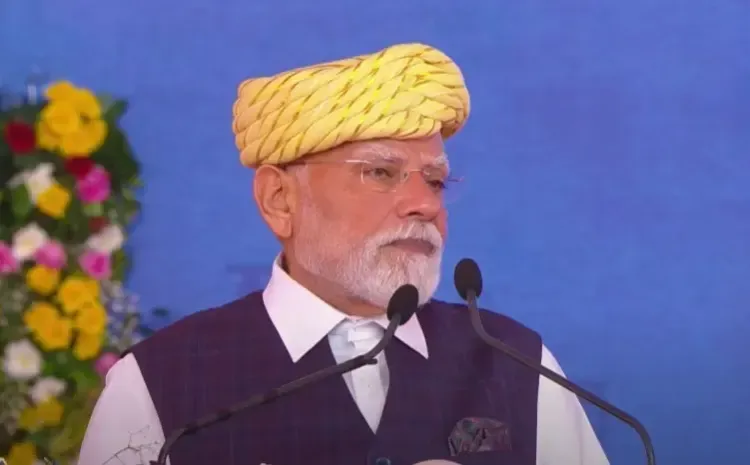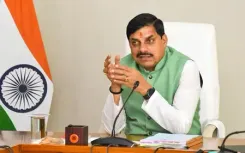Shouldn't Chips and Ships Be Made in India?

Synopsis
Key Takeaways
- PM Modi advocates for 'Atmanirbhar Bharat' to enhance self-reliance.
- Foreign dependency is identified as a major challenge for India's progress.
- Reforms in the maritime sector aim to streamline trade processes.
- Significant investments in domestic industries could lead to better economic outcomes.
- Historical context highlights India's maritime strength before foreign dependency took hold.
Bhavnagar, Sep 20 (NationPress) Prime Minister Narendra Modi emphasized on Saturday that India is progressing with the ethos of 'Vishwabandhu' (global brotherhood); however, the reliance on foreign nations remains a formidable challenge for the nation.
He stressed that products 'Made in India' are essential to realize the vision of 'Atmanirbhar' (self-reliant) India. He reiterated that whether it is about chips or ships, they must be produced within the country.
This statement was made during the 'Samudra se Samriddhi' initiative on Saturday in Bhavnagar, Gujarat, where he inaugurated and laid the foundation for various development projects across numerous sectors worth over Rs 34,200 crore.
Addressing a large crowd at Jawahar Maidan in Bhavnagar, he stated, “India is advancing with the spirit of 'Vishwabandhu' and currently has no significant adversaries globally; however, our greatest challenge is our dependence on foreign nations. This reliance must be collectively overcome.”
“Increased foreign dependence results in increased national failures. For international peace, stability, and prosperity, the world’s most populous nation must become Atmanirbhar. Relying on others undermines national dignity. We cannot entrust the future of 1.4 billion citizens to external forces. The development of the nation cannot hinge upon foreign dependency, nor can we jeopardize the future of upcoming generations... The answer to all our problems is an Aatmanirbhar Bharat,” he added.
He pointed out that for this vision to materialize, India must confront challenges, minimize external dependency, and showcase genuine 'Atmanirbharta.'
Highlighting India's inherent capabilities, PM Modi criticized the previous Congress-led UPA government, asserting that since Independence, the ruling party “systematically overlooked the nation’s innate strengths.”
“Consequently, even after six to seven decades of freedom, India has not attained the success it rightfully deserves. Two primary reasons for this were prolonged entanglement in the license-quota system and isolation from global markets due to Congress's policies,” he said.
“When globalization emerged, Congress focused exclusively on imports, leading to scams worth thousands of crores. These policies severely affected India's youth and hindered the country’s true potential from being realized,” he added.
Using India's shipping sector as a prime example of the repercussions of flawed policies, PM Modi remarked, “India was historically a dominant maritime power and one of the largest shipbuilding centers globally. Ships constructed in India's coastal regions once facilitated both domestic and international trade. Even 50 years ago, India utilized domestically produced ships, with over 40 percent of import-export activities conducted through them.”
The Prime Minister criticized Congress, stating that the shipping sector subsequently “fell victim to their misguided policies; instead of bolstering domestic shipbuilding, they chose to pay foreign vessels for freight.”
“This resulted in the collapse of India's shipbuilding ecosystem and an increased reliance on foreign ships. Consequently, the share of Indian vessels in trade plummeted from 40 percent to merely 5 percent. Today, 95 percent of India’s trade depends on foreign vessels — a reliance that has inflicted substantial losses on the nation,” he added.
Presenting statistics, PM Modi revealed that citizens would be astonished to learn that India pays nearly $75 billion — approximately Rs 6 lakh crore — annually to foreign shipping companies for their services. He pointed out that this figure is nearly equivalent to India's current defense budget.
“Had even a fraction of this expenditure been invested by previous governments into India’s shipping industry, the world would today be utilizing Indian ships, and India would be generating lakhs of crores from shipping services,” he stated.
Reiterating the concept of 'Atmanirbhar Bharat', PM Modi concluded, “To realize a Viksit Bharat by 2047, we must achieve self-reliance. There is no alternative to self-sufficiency, and all 1.4 billion citizens must commit to this resolve — whether it concerns chips or ships, they must be Made in India. With this vision, India’s maritime sector is now progressing towards next-generation reforms.”
He announced that from today, all major ports in the country will be relieved of multiple documents and fragmented processes. The introduction of the 'One Nation, One Document' and 'One Nation, One Port' initiatives will streamline trade and commerce.
PM Modi emphasized that several outdated colonial-era laws were amended during the recent Monsoon Session.
“A series of reforms has been initiated in the maritime sector, and five maritime laws have been introduced in a new form. These laws will bring significant changes in shipping and port governance,” he noted.
The Prime Minister pointed out that over the past decade, more than 40 ships and submarines have been inducted into the Navy, and apart from one or two, all have been domestically built. He mentioned that the massive INS Vikrant was also constructed in India, including the high-quality steel used for its production.
“India possesses the capability and lacks no skill. The political will necessary to construct large ships is firmly in place,” PM Modi asserted.




